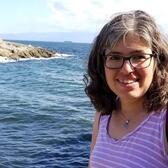Book-Banning is an Assault on Storytelling. This Passover, Let's Push Back.
“We tell ourselves stories in order to live.” —Joan Didion
Stories are life-giving. They help us feel, learn, and question. They challenge us to see things from other perspectives, contemplate nuances we haven’t considered before, and deepen our understanding of other people’s experiences. I particularly appreciate this quote, as it comes from a masterful storyteller we lost just a few months ago.
One of Didion’s most moving stories was a piece she wrote shortly after a group of young, Black men known as the "Central Park Five” were convicted of sexual assault in New York City in 1990. (Many argued at the time that the men were wrongfully convicted, and they were exonerated in 2002 when another man confessed to the crime.) Didion wrote about racism in the court system and in public opinion, and called out a rush to judgment that would have a disastrous impact on five innocent young men. She told a story that was absolutely necessary, and, for many, extremely uncomfortable. At the time, her essay was described as “bold,” “courageous,” and even “ruthless.” It was a story that needed to be told.
I find myself thinking about the quote from Didion as we approach Pesach, a holiday that centers on storytelling. Of the fourteen steps of the Passover seder, step five is maggid, the main storytelling part. In Hebrew, l’hagid means “to say, tell, announce, declare, or make known,” and in the maggid section, we are commanded to tell the story of the Jews’ exodus from Egypt, to explain the symbolism of matzoh as the “bread of affliction,” and to pose four questions central to our understanding of the Pesach experience. We get specific instructions on how to tell the story: “You should tell your children… God performed for me when I came out of Egypt.” We are challenged to experience the story not as passive observers, but as active participants in the traumatic escape of our ancestors from slavery. We relive their experiences, eat the foods they ate, and recount the drama of the plagues with the spilling of wine. Telling the story at length is considered praiseworthy.
This year, it’s jarring to be prepping for the seder in the midst of a backlash against storytelling, that central theme of Pesach. Book-banning, while nothing new in the United States, has come to the forefront of the news and our awareness, given the startling frequency of this kind of censorship in recent months. According to a recent piece in the New York Times, the American Library Association received an unprecedented 330 reports of book challenges between September 1 and November 30, 2021.
Book-banning has become politicized, with political candidates focusing their messaging on limiting access to books they find offensive. Books most frequently targeted for censorship address issues of racial justice, gender and sexuality, and historical atrocities like slavery—and, of course, the Holocaust, as evidenced by a Tennessee school board’s January vote to remove Maus, a graphic novel about the Holocaust, from its eighth-grade curriculum. This decision was met with a public outcry by the Jewish community, which has grown increasingly fearful of having this singular chapter of our history erased from the collective consciousness.
Which brings me back to Joan Didion’s deceptively simple quote. We tell stories so that we ourselves live more fully. But we also delve into stories to experience the fullness of other people’s lives—which, in turn, augments and enhances our own experiences of the world and makes us feel truly alive.
In addition to being unjust and terrifying, book-banning is a completely life-narrowing action. It deprives us of critical information about the human experience and our collective history. It erases entire lives. We must tell the stories of our country to ensure the life of our very democracy.
Several years ago, I designed a seder that focused on the history of the Sarajevo Haggadah, an illuminated manuscript thought to be one of the oldest Sephardic Haggadot in the world. Of course, it includes the commandment to tell the Passover story. It is also a banned book. Historians believe that it was produced in Barcelona in the mid-fourteenth century and then taken out of Spain by Jews fleeing the Spanish Inquisition—a time when books written in Hebrew or Arabic were destroyed in mass burnings. Centuries later, employees of the National Museum of Bosnia and Herzegovina (where the Haggadah now resides) defied a command by the Germans in 1941 to hand over the volume, instead spiriting it away to be hidden in a mosque. The Haggadah has experienced an extraordinary journey that includes generations of people working to ensure its survival, an effort that can inspire us now.
Banned books will be the theme of my seder this year. We will tell the story of our escape from Egypt, as we do every year, but other stories will also have a place at our seder table. Beloved (Toni Morrison’s devastating book about a family of formerly enslaved people), Slaughterhouse Five (Kurt Vonnegut’s anti-war novel), and, of course, Maus, will have a place of honor. Together, we will consider how to push back against the terrifying trend of book-banning, so that every resident of this country can tell, hear, and read the stories that help us live fully.







